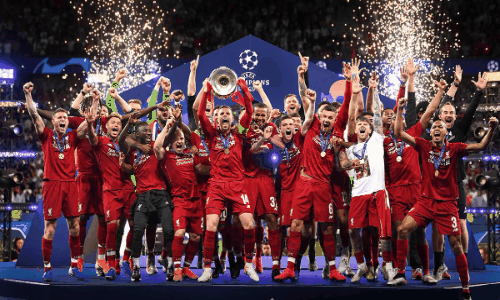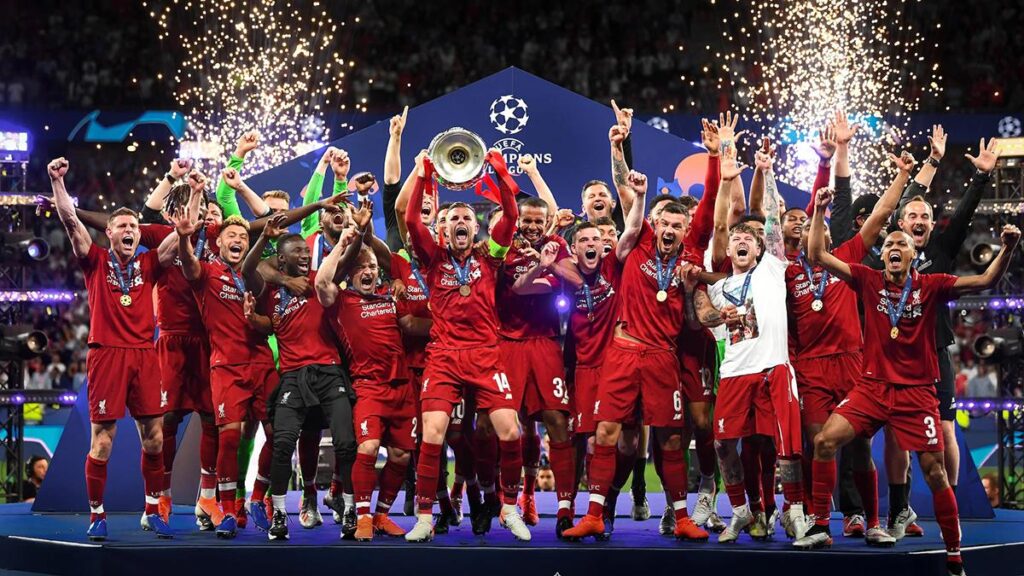Adverts
When it comes to European football, few tournaments stir up as much excitement as the UEFA Champions League.

Since its creation, the championship has been the stage for unforgettable moments, where great teams meet in historic stadiums and extraordinary players make their names in history. 🏟️⚽
Adverts
In this content, we will explore the behind-the-scenes and secrets that make the Champions League a unique spectacle. We will revisit iconic stadiums that have witnessed epic finals and analyze teams that have surprised the world with historic campaigns, surpassing expectations and establishing themselves among the football elite.
Get ready to discover interesting facts about legendary arenas such as the Santiago Bernabéu and Anfield, and remember the trajectory of clubs that challenged the European giants, proving that the Champions League is much more than just a tournament.
Adverts
It is a true celebration of sport, overcoming obstacles and passion for football. 🌍🏆
Whether you're a long-time fan or curious to learn more about the stories behind the competition, this is the perfect place to delve into the Champions League's most memorable moments.
After all, each season proves to us that, in the Champions League, the impossible can happen. ✨
Recommended Articles:

Iconic Stadiums: Stages that Shaped the History of the Champions League
Camp Nou: The Catalan fortress 🏟️
Located in Barcelona, Camp Nou is one of the most iconic stadiums in the Champions League. With a capacity of around 99,000 fans, it is the largest stadium in Europe and has been the scene of some memorable moments since its inauguration in 1957. In addition to hosting historic matches, Camp Nou is known for its vibrant atmosphere and the passion of the Barça fans, who make every match a unique experience.
One of the most memorable episodes at Camp Nou was Barcelona's epic comeback against Paris Saint-Germain in the 2016/17 Champions League round of 16. After trailing 4-0 in the first leg, the Catalan side made history by winning 6-1 to secure their place on one of the most exciting nights of the tournament.
The Catalan stadium has also hosted major finals, such as the one in 1989, when Milan beat Steaua Bucharest 4-0, marking the beginning of an era of Italian dominance in the competition. Camp Nou is not just a football stadium; it is a monument to European sport.
Wembley: The temple of English football
London’s Wembley Stadium is another iconic venue in the history of the Champions League. Rebuilt in 2007 with a capacity of 90,000, the new Wembley inherited the legacy of its predecessor, which opened in 1923. This stadium is synonymous with grand finals, both in European tournaments and domestic competitions.
The 2011 and 2013 Champions League finals, held at the new Wembley, cemented its status as one of the finest venues in world football. In 2011, Barcelona defeated Manchester United 3–1 in a display of pure talent that is widely regarded as one of the greatest performances by a team in a final of the competition. In 2013, Bayern Munich beat Borussia Dortmund 2–1 in an all-German final that epitomised the height of the Bundesliga at the time.
Wembley also carries a symbolic weight, being the place where, in 1963, Milan became the first Italian team to win the trophy, beating Benfica. This stadium is undoubtedly one of the most revered venues in the history of European football.

Surprising Teams That Gave People Something to Talk About
Porto 2004: The rise of Mourinho
José Mourinho's Porto are one of the most notable examples of teams that have exceeded expectations in the Champions League. In 2004, the Portuguese team won the title by defeating Monaco 3-0 in the final, held in Gelsenkirchen, Germany. The campaign was marked by tactical discipline, the performances of players such as Deco and Ricardo Carvalho, and the strategic leadership of the young coach, who would later become one of the greatest coaches in the history of football.
During the tournament, Porto surprised everyone by eliminating giants like Manchester United in the round of 16, with a decisive goal from Costinha in the final minutes of the second leg. This team proved that, even without a budget comparable to that of clubs in the big leagues, it was possible to achieve European glory with organization and talent.
Ajax 2018/19: Youth and boldness
Another unforgettable example of a surprising team was Ajax in the 2018/19 season. With a squad full of promising young players, such as Frenkie de Jong, Matthijs de Ligt and Hakim Ziyech, the Dutch club enchanted Europe with its attacking and dynamic style of play. Ajax reached the semi-finals of the competition, beating giants such as Real Madrid and Juventus in their path.
Their 4-1 win over Real Madrid at the Santiago Bernabéu in the round of 16 was one of the most memorable moments of their campaign. They then eliminated Cristiano Ronaldo's Juventus in the quarter-finals with a thrilling 2-1 victory in Turin. Despite being eliminated by Tottenham in the semi-finals after a stoppage-time goal from Lucas Moura, the 2019 Ajax campaign will forever be remembered by football fans.
Historic Games That Defined Generations
Manchester United 2×1 Bayern Munich: The miracle of 1999
One of the most dramatic Champions League finals in history took place in 1999 at the Camp Nou. Manchester United faced Bayern Munich and until the 90th minute it looked like the Germans would take the title, winning 1-0. However, in an incredible turnaround, the Red Devils scored twice in injury time through Teddy Sheringham and Ole Gunnar Solskjær to secure a historic 2-1 victory.
This match epitomised the essence of the Champions League: never giving up until the final whistle. The title also completed United's treble that season under Sir Alex Ferguson, marking one of the greatest achievements in the club's history.
Liverpool 3×3 Milan: The miracle of Istanbul ✨
Another legendary match occurred in the 2005 final in Istanbul. Milan took a 3-0 lead in the first half with goals from Maldini and Crespo (2). The match seemed to be over, but Liverpool staged one of the greatest comebacks in football. In the second half, the English team equalized with goals from Gerrard, Smicer and Xabi Alonso, taking the match to penalties.
In the penalty shootout, goalkeeper Jerzy Dudek excelled in saving Pirlo and Shevchenko's penalties, securing the title for Liverpool. This match not only marked the history of the Champions League, but also reaffirmed the magic and unpredictability of the tournament.
The Evolution of the Format and its Impact on Narratives
From an elite tournament to a global spectacle
When it was created in 1955, the Champions League – then called the European Cup – was a tournament restricted to national champions. Over the decades, the format has expanded, allowing more clubs to enter and increasing the number of matches. Today, the Champions League is a global spectacle that attracts billions of viewers around the world.
The group stage, introduced in the 1990s, was a turning point, allowing more clashes between the big clubs. From then on, the tournament's narratives became even more exciting, with twists and turns, upsets and historic rivalries.
- 1990s: Consolidation of the modern format, with the entry of runners-up and teams from smaller leagues.
- 2000s: Growth in global prestige, driven by television broadcasts and new markets.
- Current era: Domination by clubs like Real Madrid and Barcelona, but with room for surprises, like Villarreal and RB Leipzig.
The financial and cultural impact 🌍
The Champions League is not just a sporting event; it is an economic and cultural engine. The tournament generates billions in revenue for clubs, sponsors and federations. It is also a platform for players to showcase their talent and gain global recognition.
The cultural impact is also significant. Iconic moments from the Champions League transcend football, becoming part of the collective memory of different generations. It is no wonder that the tournament continues to be one of the greatest spectacles in world sport.

Conclusion
The UEFA Champions League is much more than just a football tournament; it represents a celebration of excellence, passion and achievement on the European pitch ⚽. Over the years, the iconic stadiums and incredible teams that have marked its history have provided unforgettable moments, creating memories that will forever remain in the hearts of fans. Through epic clashes, historic goals and incredible comebacks, this championship has cemented its status as the greatest stage for club football in the world 🌍.
Furthermore, the rich cultural diversity that surrounds the Champions League connects millions of fans around the globe, proving that sport is capable of transcending borders and uniting nations. Each season, the tournament reinvents itself, bringing new surprises and reaffirming the passion that only football can awaken. Therefore, whether in the legendary stadiums that have witnessed glory or in the remarkable performances of unexpected teams, the Champions League continues to write a narrative that combines tradition, innovation and pure emotion ❤️.
If you are passionate about football and are looking for fascinating stories, the Champions League is a true treasure that never ceases to amaze. Get ready, because the next pages of this story are already being written! 🏆




